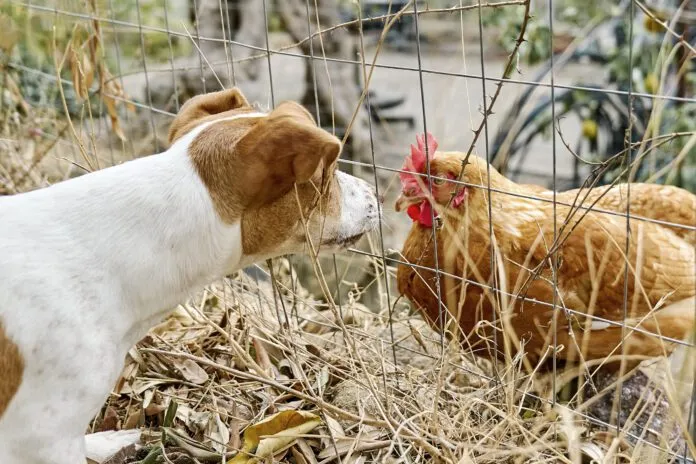Bird flu is making the news a lot lately, and you may wonder if dogs can catch bird flu. Also called avian flu or referred to as H5N1, this virus has the potential to expand its horizons beyond birds to humans and other mammals. As of this writing, no dogs have become clinically ill or died from this recent strain of H5N1 bird flu.
However, dogs can become infected with “H3N8 or H3N2 influenza viruses, but those are different forms than the current outbreak of H5N1,” according to Cornell University’s College of Veterinary Medicine.
A report from Ontario, Canada, in April 2023 confirmed the case and death of a dog with avian flu. In this case, the dog scavenged a dead goose who was infected.
Bird flu has been found in:
- Dairy Cattle. Milk cows usually have a mild infection, but it can contaminate their milk.
- Human dairy workers have gotten mild cases of this flu virus, primarily as eye infections, from working around infected cows.
- Bird flu is commonly fatal in cats. Neurologic signs are generally the first clue that this is more than a standard respiratory infection and sudden death may be the first indication of a truly serious problem. Farm cats have been infected via raw milk, feral and outdoor cats have gotten infected from catching ill birds, and indoor only cats who have eaten raw foods made from infected poultry have died.
- Foxes and Mink. In Finland, fur farms have lost large numbers of foxes and mink due to avian flu.
Managing your Dog’s Exposure to Bird Flu
While bird flu tends to run somewhat in cycles, it is spread by migrating birds. Obviously, you can’t put your dog in a bubble to prevent all potential bird exposure.
What you can do is sensible management:
- Don’t feed raw milk or dairy products made from raw milk. While the processing to make cheese or yogurt might kill the H5N1 virus, no one knows for sure at this time.
- Avoid feeding raw diets that contain poultry. While your dog might not die, he can get sick if the meat is contaminated and his feline buddy could very well die. Practice good food handling techniques if you feed any raw diet. Freezing and freeze drying do not kill the virus
- Keep your dog away from dead or ill birds. Don’t frequent parks, ponds or any areas where large flocks of birds congregate. This is especially important in spring and fall when there are large migrations. This includes songbird migrations as well as waterfowl.
Remove bird feeders. This is especially important if there are reports of avian flu in your area. In those situations, consider taking feeders down for a while to discourage birds hanging out in your yard.
No Bird Flu Canine Vaccine
There is no vaccine for avian flu, and your dog’s canine flu vaccination will not provide cross protection. So far, there are no cases where a sick person gave a dog bird flu or vice versa, but the potential is there. The more cases of bird flu occur, the greater the likelihood of mutations that would allow the spread to more species.
Currently, work in the United States on bird flu has been greatly curtailed, but it has been considered a virus possible of causing a pandemic if mutations allow for more spread.








